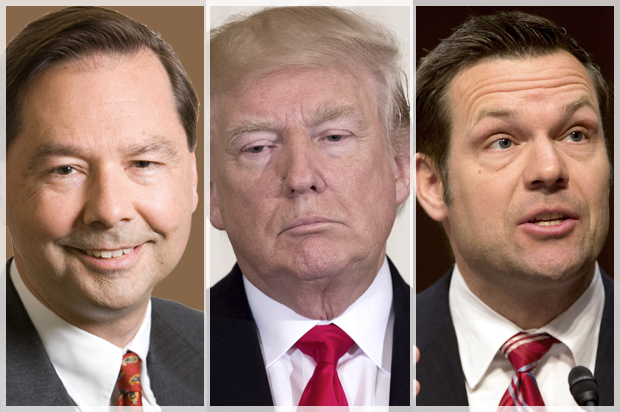While there is little debate that the mainstream media is Donald Trump’s No. 1 rhetorical foe, the president regularly vacillates between lashing out at Democratic and Republican lawmakers alike. Trump’s willingness to continue bruising, public intra-party fights has been one of the fascinating developments of his first six months in office. Now the civil war within the Republican Party is being fought on a surprising new front: the myth of voter fraud.
Shortly after his election, Trump set off on a self-serving mission based on a false narrative of expansive voter fraud that was rejected by virtually everyone. In May, he created a national commission by executive order to fuel that narrative. Now he’s bullying Republicans who dare push back against his federal invasion of state-held records — a classic case of Big Government overreach if ever there was one.
Maryland’s Republican deputy secretary of state Luis Borunda, a member of Trump’s Presidential Advisory Commission on Election Integrity, abruptly resigned on Monday. The commission, which Trump has specifically called a “voter fraud panel,” sent a letter to every state in the country on Thursday requesting voter data including names, addresses, felony convictions, voting history through 2006, party affiliation, multi-state voter registration and the last four digits of Social Security numbers. Maryland, along with 13 other states and the District of Columbia, rapidly said it would not comply with the request.
Although Borunda actually had nothing to do with Maryland’s decision to rebuff his own commission (the Maryland secretary of state’s office does not oversee that state’s election process), the timing of his resignation from the controversial panel is curious. On Friday, deputy press secretary Sarah Huckabee Sanders called the refusal to hand over voter information “mostly a political stunt,” and on Friday Trump lashed out on Twitter.
Numerous states are refusing to give information to the very distinguished VOTER FRAUD PANEL. What are they trying to hide?
— Donald J. Trump (@realDonaldTrump) July 1, 2017
Nearly every state in the union has now refused to comply, either entirely or in part. A majority of the states that have issued public statements in defiance of the order are governed by members of the president’s own party.
Arkansas Gov. Asa Hutchinson, a Republican, directed his secretary of state not t release any sensitive information to the panel. “The request is simply too broad and includes sensitive information of Arkansas voters,” Hutchinson said in a statement.
“They can go jump in the Gulf of Mexico and Mississippi is a great state to launch from,” Mississippi’s Republican secretary of state, Delbert Hosemann, said in a statement last week.
Created after Trump claimed on Twitter in November that he “won the popular vote if you deduct the millions of people who voted illegally,” the panel is chaired by Vice President Mike Pence and Kansas Secretary of State Kris Kobach, a longtime advocate of voter-identification laws and an Oxford-educated lawyer. Kobach was also recently sanctioned by a federal court for “deceptive conduct and lack of candor” — and his own office is withholding voters’ social security information from his panel. Maine’s secretary of state, a member of Kobach’s commission, isn’t providing the requested data either — because Maine law won’t allow it.
“The President’s Commission has quickly politicized its work by asking states for an incredible amount of voter data that I have, time and time again, refused to release,” Louisiana’s Republican Secretary of State Tom Schedler said in a scathing statement. Arizona’s GOP secretary of state called the commission a “hastily organized experiment.”
Kobach was quick to call the Republican revolt “fake news” on Wednesday, but the description of a “hastily organized experiment” may be just the spin needed to protect Trump’s commission from charges it has also broken the law.
As Stuart Shapiro, director of the Program in Public Policy at the Edward J. Bloustein School of Planning and Public Policy at Rutgers University, explained, the commission’s request for information is an apparent violation of the Paperwork Reduction Act. Passed in 1980, the law requires federal agencies to receive approval from the Office of Information and Regulatory Affairs before seeking such private information:
Under the PRA, the Commission must calculate the burden on state officials of complying with the information request. The Commission must also explain how it will protect and eventually dispose of the information. Perhaps most importantly, given the uproar the letter has generated, the Commission must also explain why the government needs the information and how it will be used.
Trump has never offered any evidence to back up his initial claim that three million illegal voters in the 2016 election, a claim that remains unsupported by any major election official of either party. Now, while he keeps up his attacks on a free press, his minions are ignoring the nation’s already abysmal voter participation levels to attack another one of the nation’s most fundamental rights. This dubious commission’s own incompetence and acts of collective civil disobedience by Republican secretaries of states (often bounded by privacy laws) appear to have blunted this attack, at least for now. Let the GOP civil war rage on.

